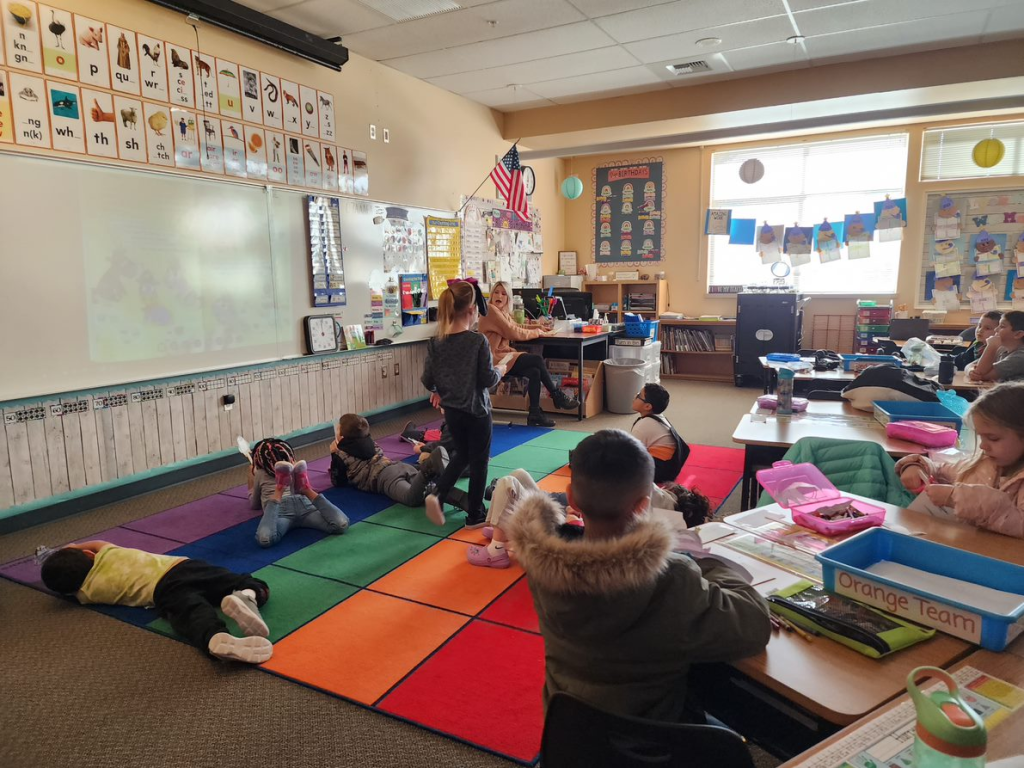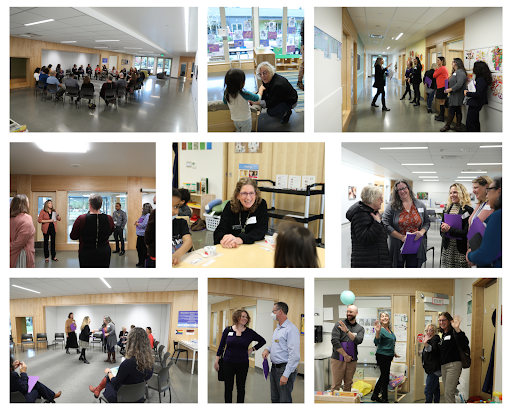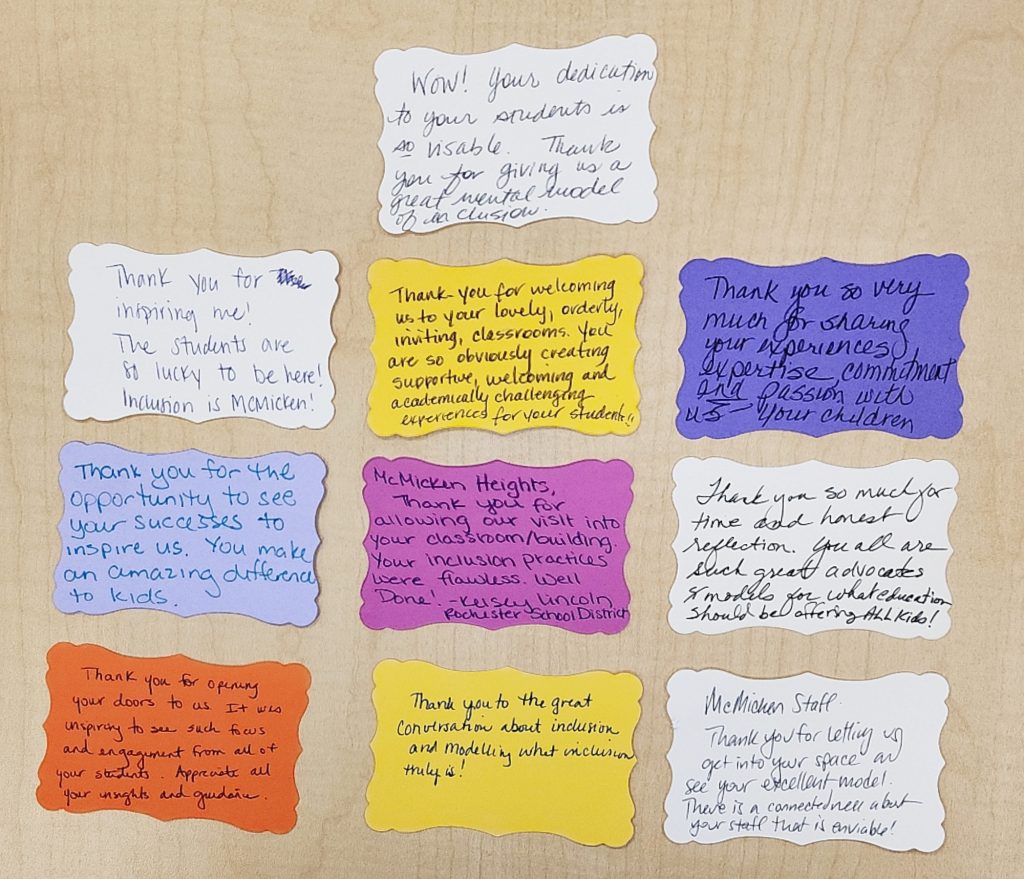Interested in seeing what inclusionary practices look like in Early Childhood Education Settings? If so, the Preschool and Early Learning Center IPTN Demo Sites are offering transformational professional development in the form of in person site visits in the 2023-2024 school year. Submit a visit request form found on the Schedule a Visit page on the Demo Sites website and an inclusion specialist will reach out to talk more about what this could look like for your team. Our early learning Demo Sites highlight the following inclusive practices: inclusive mission and vision, MTSS, the Pyramid Model, differentiated instruction, culturally responsive pedagogy, braided funding, family and community partnerships, flexible service delivery, coordination and collaboration, and how to support CTE students in a preschool setting. Visit the Demo Sites preschool web page to learn more about Edwin Pratt Early Learning Center in Shoreline, Kodiak Cubs Preschool in Leavenworth, and Robert Lince Early Learning Center in Selah. We are looking forward to hearing from you!
Category: Demosites
Family Engagement Case Study
The IPP Demonstration Sites continue to partner with others and showcase their inclusionary practices. Take a look at the IPP Family Engagement Collaborative Inclusive Education and Family Engagement report. This report describes how two demo sites, Chase Middle School and Kodiak Cubs Preschool, have implemented inclusive education and family engagement. The case studies highlighted in the report are intended to document the knowledge and lived experiences of parents, educators, students, and technical assistance providers related to partnering with families to provide meaningful, inclusive education for students. Both demo sites are committed to establishing a culture of inclusive education in their settings and are exemplary in their work but use different strategies to ensure implementation is reflective of their local context, strengths, and needs.
Welcome, Monroe High School!
We are honored to welcome Monroe High School to the IPP Demonstration Sites Project as a model demonstration site. Monroe High School has been in collaboration with UW over the past two years. With visionary leadership from Principal Brett Wille, Assistant Principal Noah Wallace and educators Matt Chalfont and Mindy Haas, the MHS community has been steadfast in their efforts to put forth into practice their vision for an inclusive school for all.
Monroe HS highlights the inclusionary practices of co-teaching, co-planning, collaboration, professional learning communities and inclusive master schedule. MHS hosted a visit last spring and is open for visits in the 23-24 school year.
Monroe High School and Monroe School District serve as a prime example of scaling to build district capacity. At the district level, David Paratore and Joy Castillo have shown the importance of district leadership to foster sustainable processes and systems. Monroe school district is home to Hidden River Middle School, which was one of the first IPP demonstration sites in 2019.
Teams visit Mark Twain Elementary School
Mark Twain Elementary School in Lake Washington School District just closed out its inspirational and transformative 2022-2023 tour season. This year they hosted school teams from all over Washington and Oregon. Led by the administrative duo of Principal, Craig Mott and Associate Principal, Malia Goodfellow, visitors learned about the school’s inclusive journey and how they have created an inclusive master schedule to support student access and engagement in core content instruction, as well as flexible service delivery. Additionally, participants learned about the school’s commitment to grade level common planning to support strong tier 1 instruction as well as how to leverage “power groups” (I.e., intervention blocks) as a way for students to receive targeted instruction on a six-week cycle.
During most tours, MTSS Coach, Sara Celms spoke about Mark Twain’s work supporting teams’ progress in their implementation of the Universal Design for Learning (UDL) framework, differentiation, and resource mapping. The goal of resource mapping is to look at collective resources and strengths of a community in order to fully optimize school resources as a way to support all learners.
5th grade special education teacher and case manager, Alisha Poling, took visitors through some learning about grade level common planning, as well as the important journey toward writing more inclusive Individualized Education Plans (IEP). Drawing from the TIES 5-15-45 planning tool, grade level teams engage in the collaborative process of planning to ensure that all students are appropriately supported during core content instruction. Common planning occurs every Wednesday morning before school and is kept sacred, meaning that no other meetings occur on Wednesday mornings. Additionally, Ms. Poling provided visitors with examples of inclusive and non-inclusive IEP goals and discussed how changing the way goals are traditionally written open so many more opportunities for students to learning in the general education setting as well as in more naturalistic and generalizable ways.
Finally, 3rd grade general education teacher, Jamie Chapple, shared her journey with visitors as she learned how to teach students with extensive support needs (ESN) and the importance of communication and collaboration with families. One of the tools that Ms. Chapple and other teachers find helpful is the Ohio State Extended Learning Standards. These standards provide teachers with information on how to break down state standards to support student learning growth through targeted scaffolds.
We appreciate the Mark Twain Elementary Team for opening their doors and allowing participants at various stages in their inclusive journeys the opportunity to come and learn from a school and a group of inclusive leaders so open and transparent about their work!
“Our visit to Mark Twain was amazing! We were heartened and motivated to continue our inclusion work.”
“Thank you for sharing your journey and being transparent about the work. We are so grateful for this opportunity!”
Collaboration at Clovis Point Elementary School
In 2020, then Clovis Point Intermediate in East Wenatchee was selected as a demonstration site. Clovis highlighted the inclusionary practices of assistive technology, co-teaching, collaboration, and modified grading rubrics. In 2021, Clovis Point transitioned to an elementary school, complete with a fully inclusive playground while still prioritizing inclusion.
In the past two years, the Clovis Point team has focused on building its new community, reimagining inclusive education in their new elementary context and still building on the strengths they harnessed as an intermediate school. As an elementary school, Clovis Point is early in its new inclusive journey – but has a strong base to build upon. Collaboration, collective ownership of student learning, and creating a sense of belonging for all students and staff is apparent as one walks through the school and engages with students and educators. Principal, Amy Dorey states, “We continue to use some of the same inclusionary practices as Clovis kept 5th and 6th-grade students – while looking into how to add more for the younger grades. We have learned how important it is to support teachers and students along their learning journey. My hope is that ALL staff and students feel that they belong at Clovis and that we are a community of learners who support and care for each other.”

Demosites host Washington State Leadership from OSPI and the Legislature
Demonstration site visits are a transformational learning process and a chance for visiting schools to engage with the educators at the sites. This year the Demonstration Sites have opened their doors more than ever and had the opportunity to host many schools across the state, international educational leaders, as well as Washington State leadership from OSPI and the legislature. Edwin Pratt Early Learning with the support of their superintendent hosted 9 leaders from OPSI, 5 representatives from WA State legislature, an Educational Service District representative from PSESD, and the shoreline school board. At this visit inspiration sparked and more interest to see other sites followed. Hood Canal Preschool has the opportunity to host OSPI leadership in December.
In this professional development the Demonstration sites have the opportunity to share their journey. Concepts discussed are barriers perceived and real they have overcome or are working to address, the asset based approach used throughout their journey, inclusionary practices they are leveraging to promote inclusion in their community, as well as next steps.
There are more opportunities to see these and other demonstration sites in action this winter and spring. Click here to schedule a visit. All are welcome!

IPP Demo Sites: WASA Visits McMicken Heights
The month McMicken Elementary hosted WASA and Steilacoom SD. This visit features how McMicken and Highline SD are connecting with district leadership from visiting school districts who are eager to learn how to increase capacity and build sustainable systems. Thank you to WASA, our IPP cadre partners, for your continued collaboration and efforts to increase district scale. A huge shoutout to McMicken to be so gracious in sharing your school, ever evolving inclusive journey and artifacts with visitors.

Professional Learning Plan
In our work and through collaboration with school and district leadership, we often hear that their WHY for inclusive and equitable education is more clear to them, but HOW to change systems, implement and sustain more inclusive practices are what they are still needing to understand more fully. We are excited to share the Inclusive Education Prof Learning Plan. The plan supports both the WHY and HOW by focusing on five identified priority areas of Rationale for and Research, Collaborative Lesson Planning, Inclusive IEPs and Education Day-at-a-Glance, Creating a Culture of Belonging and Peer Engagement and Inclusive Service Delivery. The plan is intended to break down ongoing professional learning into smaller accessible pieces. Teams can choose what content fits their current needs and priorities. Please reach out to RinaMarie Leon-Guerrero rinalg@uw.edu if you have questions or comments on this plan. Watch this short video description